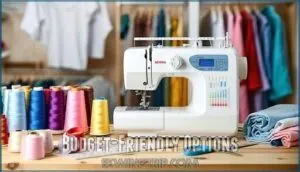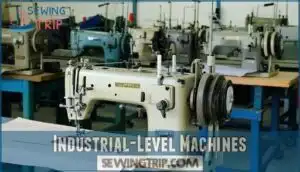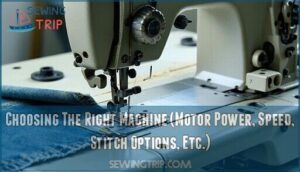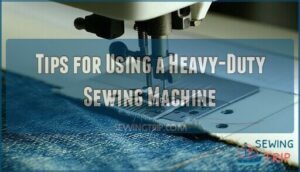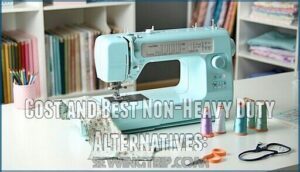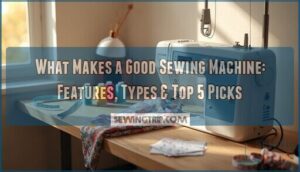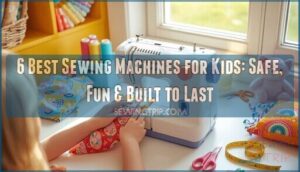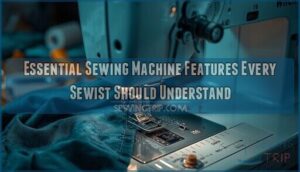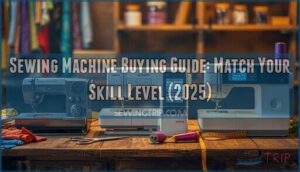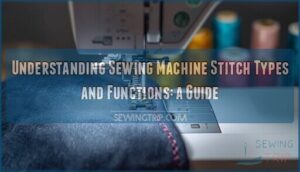This site is supported by our readers. We may earn a commission, at no cost to you, if you purchase through links.
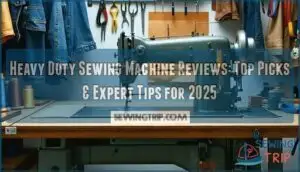
Models like the Singer 4423 or Janome HD3000 stand out for durability and motor power, making them perfect for heavy workloads.
If you need industrial-level performance, check out Juki industrial machines—they’re built like tanks. Pay attention to features like stitch speed, presser foot pressure, and motor strength.
A strong metal frame is non-negotiable for stability. Ready to sew through layers without breaking a sweat? Stick around for tips on choosing the right model for your projects!
Table Of Contents
Key Takeaways
- You’ll want a heavy-duty sewing machine with a sturdy metal frame, strong motor, and stitch speeds between 800-1500 SPM to handle thick fabrics like denim or leather.
- Budget-friendly options like the Singer 4423 and Brother ST371HD offer great performance for the price, while industrial models like Juki machines deliver professional-level durability.
- Look for features like adjustable stitch options, tension control, and presser foot pressure to tackle heavy sewing projects with flexibility and precision.
- Proper care like using the right needles, heavy-duty thread, and regular maintenance will keep your machine running smoothly for years.
Heavy-Duty Sewing Machine Overview:
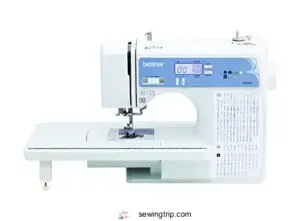
A heavy-duty sewing machine is your go-to tool for tackling demanding projects.
Built with durability and power in mind, these machines handle thick fabrics like denim, leather, and canvas with ease.
Built for durability and power, heavy-duty sewing machines conquer thick fabrics like denim, leather, and canvas effortlessly.
With speeds up to 1,500 stitches per minute and powerful motors, they deliver precision and reliability.
Whether you’re working on upholstery or multiple fabric layers, they’re designed to produce high-quality stitches without skipping, making them perfect for professionals or hobbyists, balancing strength and versatility while staying portable and user-friendly.
Best For: Sewing enthusiasts, professionals, or hobbyists who need a reliable machine for thick fabrics, multiple layers, or heavy-duty projects.
- Handles tough materials like denim, leather, and canvas smoothly.
- High stitching speed for faster project completion.
- Durable and portable design ideal for versatile use.
- May be more expensive than standard models.
- Heavier and bulkier, requiring more storage space.
- Advanced features can have a steeper learning curve for beginners.
Heavy-Duty Sewing Machine Models:
When you’re choosing a heavy-duty sewing machine, it’s essential to focus on models that match your specific needs for power, speed, and durability.
Whether you’re sewing thick fabrics or tackling large projects, these machines offer reliable performance with features designed to handle tougher tasks.
Budget-Friendly Options
If you’re looking for affordable heavy-duty options, there are some incredible choices that balance performance and cost.
Affordable heavy-duty sewing machines offer the perfect blend of performance, durability, and value for tackling tough projects with ease.
To find the best value for your sewing machine budget, consider:
- Beginner machines like Singer 4411 for precision and ease.
- Models with affordable durability, like Brother ST371HD.
- Used options or refurbished machines for great discounted models.
- Machines offering multiple stitch functions at a lower price.
You can also find an affordable sewing machine online through various retailers, and compare the sewing machine price range against features like motor power and stitch speed for the best deal.
Industrial-Level Machines
If you need industrial-level performance with professional-grade machines, industrial sewing machines deliver unmatched results.
They are built for specialized tasks and heavy-duty sewing, these commercial sewing machines offer industrial durability, strong motors, and precision.
Models like the Consew 206RB-5 (3,300 SPM) handle thick fabrics like leather, while the Juki TL-2010Q excels in quilting.
For a range of options, consider exploring an industrial sewing machine, they’re perfect for serious projects.
Tips for Purchasing and Using:
When buying a heavy-duty sewing machine, focus on features like motor strength, stitch speed, and material compatibility to match your sewing needs.
Use the right needles, threads, and settings to guarantee smooth operation and durable results, considering the right needles is crucial for the outcome.
Choosing The Right Machine (Motor Power, Speed, Stitch Options, Etc.)
Picking the right heavy duty sewing machine comes down to balancing motor power, sewing speed, and stitch options. Machines built with stronger motors handle thick materials like denim or leather smoothly.
Look for speeds between 800-1500 stitches per minute for precision and efficiency. A sturdy, metal-framed body guarantees machine durability and long-term use.
Consider these factors:
- Motor power for tackling tough projects.
- Adjustable stitch options for creative flexibility.
- Reliable sewing machine speed for faster results.
- Sturdy fabric capacity for various layers.
- Quality builds with long-lasting warranties.
Tips for Using a Heavy-Duty Sewing Machine
Mastering a sewing machine for thick fabric isn’t rocket science, but it does take finesse. Focus on these steps for heavy-duty sewing success:
- Needle Selection: Use topstitch or denim needles to handle tough fabrics.
- Thread Types: Pair heavy-duty thread with finer bobbin thread. You can find a variety of options when you shop for thread.
- Fabric Handling: Control fabric movement; use guides for clean lines.
- Maintenance Schedule: Oil parts regularly for smooth operation.
- Stitch Settings: Adjust tension to prevent skipped stitches.
Cost and Best Non-Heavy Duty Alternatives:
Want a reliable machine without overspending? Non-heavy-duty machines are versatile, offering solid features for lighter projects.
Options like the Brother XR9550 and Janome New Home Blue Couture stand out for affordability and performance.
- Budget alternatives for light to moderate sewing.
- Lower repair costs with simple maintenance.
- Handles standard fabrics with ease.
- Great for casual or occasional usage.
Frequently Asked Questions (FAQs)
What is the difference between singer and heavy-duty?
Comparing Singer and heavy-duty machines is like deciding between a reliable wagon and a workhorse.
Singer covers a range of models, while heavy-duty machines specialize in power, durability, and handling thicker, tougher fabrics effortlessly.
Are heavy-duty sewing machines a good choice?
Heavy-duty sewing machines are a smart choice if you’re tackling thick fabrics or large projects.
They offer durability, powerful motors, and reliable performance, making them ideal for both beginners and pros needing robust, long-lasting equipment, with reliable performance being a key factor.
What is a heavy duty sewing machine?
Think of a heavy-duty sewing machine as a workhorse—it’s built tough, handles thick fabrics like denim or leather, and powers through projects with speed and precision.
It makes the machine perfect for durable, complex sewing tasks.
How long does a heavy-duty sewing machine last?
A heavy-duty sewing machine can last decades with proper care and regular maintenance.
Its durable metal frame and sturdy motor are built for the long haul, though neglecting upkeep might shorten its lifespan substantially.
How much does a heavy duty sewing machine cost?
A heavy-duty sewing machine typically costs between $300 and $1,
Basic models fit tighter budgets, while feature-packed versions come with higher price tags.
It’s worth investing in quality for durability and versatile performance.
What are the different types of heavy-duty sewing machines?
Imagine a workhorse built for fabric—heavy-duty sewing machines come in mechanical, computerized, and hybrid types.
Each offers unique strengths, from rugged simplicity to advanced features, catering to varied needs like quilting, leather, or upholstery.
How many stitches should a heavy-duty sewing machine have?
A heavy-duty sewing machine should ideally have 14 to 37 stitches, covering basics like straight and zigzag, plus decorative options.
Focus on your project needs—fewer stitches often mean easier operation and higher durability.
What is the most reliable brand of sewing machine?
Shopping for reliability in sewing machines feels like picking a car—Brother, Singer, and Janome dominate.
Each boasts durability, precise stitching, and diverse features suited to various needs, keeping your projects smooth and frustration-free.
Which is better, singer 4423 vs 4452?
The Singer 4452 edges out by offering added durability and extra accessories, like a walking foot, for tougher projects. But the Singer 4423 is budget-friendly, ideal for casual sewing with similar performance.
What is a good heavy duty sewing machine for beginners?
For beginners, the Singer 4411 is a solid pick–it’s sturdy, simple, and swift.
Its user-friendly features, like adjustable stitch length and a powerful motor, make learning stress-free while sewing thick fabrics feels effortless.
Conclusion
In the context of sewing machines, the proof is in the pudding—choosing the right heavy-duty model can make or break your projects.
From budget-friendly options like the Singer 4423 to industrial workhorses like Juki machines, it’s all about matching your needs to the machine’s capabilities.
Prioritize motor power, stitch options, and durability for tough jobs.
With these heavy duty sewing machine reviews, you’re ready to tackle any fabric challenge with confidence and precision. Happy sewing!

